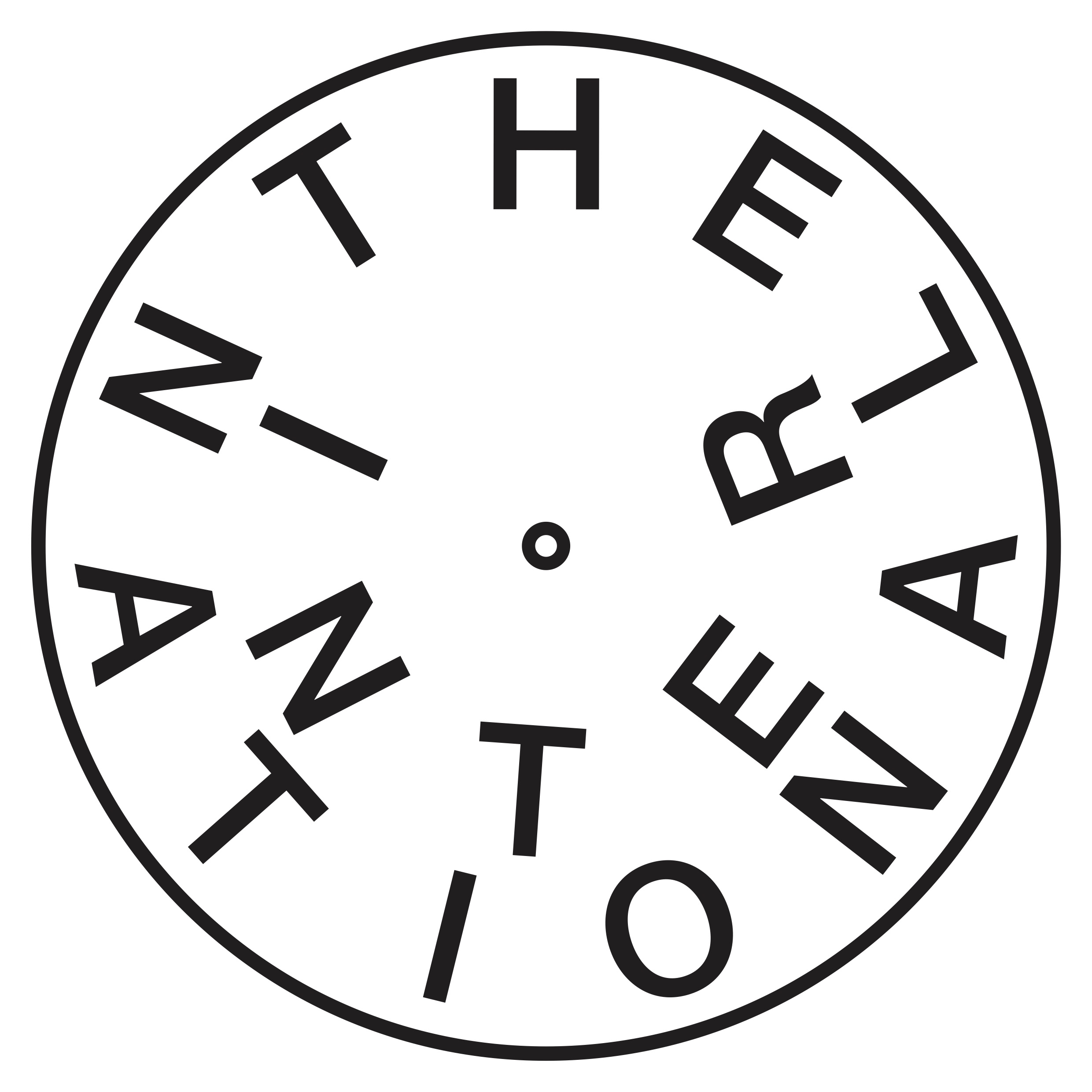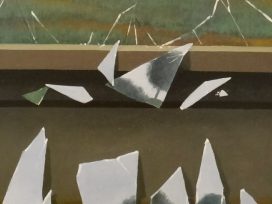What is international?
In May, fifty years on from the events of 1968, the ‘The Kyiv International – ’68 NOW’ project reflected on the political and cultural heritage of the revolt and struggle of that year. In particular, the project’s curator and the head of Kyiv’s Visual Culture Research Center (VCRC) Vasyl Cherepanyn asks, where is the idea of internationalism today?

Emblem by Experimental Jetset, Amsterdam 2018
If we look at the recent ‘square movements’ and social uprisings around the globe – from Occupy Wall Street and Europe’s Indignados to the Arab Spring and the Ukrainian Maidan – in spite of the differences, they all were aimed at some utopia in the future, they presented the politics of hope. Today the logic of revolutionary utopia has turned into reactionary post-apocalyptic dystopia – the wars in Syria and Ukraine, ISIS, extreme right-wing populism, Brexit, Trump – all of them represent the politics of ressentiment, they lack a vision of the future; quite the opposite, they are obsessively concentrated on the past, on memory wars, acting out social frustrations through history. The radical substitution of a revolutionary chance with warfare has become the mark of our time.
Zombieland – that is our status quo today. Repression and regression form the current ideological coordinate system – the repression of emancipatory political potential, and regression to barbaric sub-political discrimination and isolation. We live today not in the post-truth world but in the pre-truth world – in a world where truth has not yet arrived. Wars are always about the past, they pretend to solve some antinomies of the past, and it is revolutions that are about the future. War is basically a poison against the future, a way to stop it.
Attempts to establish some founding, usually national, myth are often based not on history but on false memories, nostalgia for something that never happened. The right question to ask regarding the main slogan of the assorted populists of today – the famous Trumpian ‘Make America Great Again!’ – is: When was that ‘again’? This ‘again’ has never existed, it is not history but a false projection: that kind of isolationistic backwardness is a dead-end in an ontological sense, literally a fake.
The current political vacuum is being occupied by militarism, violence and terror. Never-ending hybrid civil war on a global scale, newly emerging anti-migrant walls and necro-politics of memory are defining the lives of our societies. The political unconsciousness nowadays is counter-revolutionary. How to think about the political alternative: what do we need for that?
It is a very challenging task, and we have to be ready to meet the unexpected and put aside our political clichés and prejudices. Speaking from an institutional perspective, the question lies at the intersection of three realms – knowledge, art and politics – which reflect three ‘isms’ pivotal for the idea of the International today.
Universalism, or the politics of knowledge
As a university teacher and cultural practitioner, I am confident in the key principle which one must remain faithful to – that society has invented places of knowledge (universities, educational and cultural institutions) as topoi where it can comprehend and analyse its own foundations. These places in the social structure provide a crucial and extremely important possibility – to think, criticize and debate about the grounds that society itself is based on, to trace and propose alternatives and different variants of social development.
Knowledge is not a luxury but a responsibility, neither a privilege nor a commodity, but a tool for social change, a method of rethinking and transforming those a priori assumptions we are built on. Lack of proper reflection and critical analysis leads to a rupture between ‘theory’ and ‘practice,’ in which knowledge turns into theoretical hallucinosis and political practice – into vulgar cynicism.
Humanities, critical theory, socially engaged knowledge are anti-isolationist in principle, because they enable the manifestation of the universal – that is universitas, university itself. This position is universal for all specialities or modes of ‘doing’ something. As German philosopher Hans-Georg Gadamer noted, studying the humanities is in itself human; their development is the development of human capabilities, of what every one of us can be.
Thinking and reflection are urgently needed in the Ukrainian context today, during the counter-revolution or, rather, two counter-revolutions, amid which we find ourselves. The first one is external, in the form of Russian military intervention and occupation of Ukrainian territories, and the second one is internal and no less dangerous – corruption, oligarchy, lack of justice, political assassinations, far-right populism, the expansion of everyday violence that are gradually destroying society. In the post-revolutionary time, learning and reflection are the most effective antidote to counter-revolution, even in the form of war.
Ukrainian society today is in an extremely traumatized condition, and not just from a single trauma but a historical complex, a layering of both past and recent traumas. The trauma of Soviet repressions, the trauma of the wild capitalist ‘transition’ period that produced the oligarchy, the trauma of permanent absence of social and legal justice, the trauma of revolutionary violence, the trauma of war – all of them remain not worked through, not properly articulated and unresolved, overlapping and superimposed on each other. In this situation, society is being kept as their hostage; its sensitivity is eroded together with its constantly increasing rejection of all new cases of violence and death.
Reflection is a way to overcome social regression. Violent traumas require articulation, analysis and comprehension, not censorship and taboos. We need to analyse and critically reflect on our past and recent social and political experience, to work through what we have lived through – without repression or negation, but with full awareness of our responsibility. This task, paraphrasing the purpose of psychoanalysis defined by Freud, can be formulated as follows: where violent id was, reflective ego should be. The work we must do to get out of the current deadlock of violence is long and hard, but necessary – because there is no other way out of it.
Modernism, or Lenin After Maidan
As we know from Habermas, modernity is an unfinished project, it needs fulfilment and accomplishment. What we can learn from modernism as a total phenomenon is what is at stake in politics nowadays – instead of sticking to a left-right divide, we must make the radical step to rethink the whole political spectrum as such. One hundred years ago they competed to demonstrate who was the better socialist; our current counterpart is to see who is a better nationalist. The question of modernism is about the political power of imagination, what vision can outline our common future.
In Ukraine, together with Soviet memorials, the visuality of the modernist avant-garde tradition has been wiped out from the public space as a disturbing symbol for counter-memories and alternative historical narratives. ‘Patriotic’ populism externalizes the Soviet period and retroactively nationalizes historical memory, using the communist past for redistribution of political and symbolic capital today. This repression of memory results in the revenge of memory in all the new forms of social destruction that we observe today.
But the modernist epoch contains a real emancipatory potential – it was the most modern period in the history of Ukrainian culture. What we can learn from it is something very urgent and challenging for today’s counter-revolutionary status quo, which is how to be contemporary. ‘Decommunization’ is a continuation of the war by other means, it is a war against being modern. As a project open to the future, the modernist legacy in contemporary cultural and political practices can indicate a possible exit strategy from the political deadlock of economic crisis, nationalist populism and war.
The main political event of modernism was of course the October Revolution. It was not by accident that all the avant-garde movements constantly referred to it. And it was exactly the abandonment of an internationalist approach that degraded the outcomes of the revolution and resulted in the horrible atrocities and repressions of Stalin’s time.
This event is crucial for Europe, since what was finally prompted by the Holocaust and monstrousness of World War II – the European Union – was originally planned after World War I. The very basic idea of launching the project of a united Europe was about establishing peace on the continent – where there is Europe, there is peace – and this task remains urgent. The first decree Lenin issued on the very next day after the October Revolution was on peace. ‘Immediate democratic peace concluded by all the belligerent nations without annexations and without indemnities’ is claim just as incredibly radical today.
Just a day before the October Revolution, when talking to John Reed regarding future developments, Trotsky said: ‘The Federated Republic of Europe – the United States of Europe – that is what must be. National autonomy no longer suffices. Economic evolution demands the abolition of national frontiers. If Europe is to remain split into national groups, then Imperialism will recommence its work. Only a Federated Republic can give peace to Europe and to the world.’ That way of thinking applied to the whole planet, but the revolution in Russia was first of all aimed at Europe. Initially, the capital of the Union was not to be Petrograd or Moscow, but Vienna or Berlin. The official language of the Third (Communist) International founded by Lenin (as the Second International discredited itself by supporting the war) till 1922 was German.
What appeared as the Soviet Union was first supposed to be a European one. It was restricted to ‘socialism in one country’ because of the defeat of communist revolutions in Europe in 1917–1923, foremost in Germany. Internationalism was then abandoned by the Comintern, which became a means of geopolitical foreign force of the Soviet state. A united Europe was a communist idea which was restarted in a different form only after the downfall of the Nazi regime. And in a special irony of history ‘The Communist Manifesto’ was written in Brussels.
Internationalism, or the subject and the square
What we have recently observed during the revolts and uprisings from Puerta del Sol and Syntagma to Tahrir and Maidan was in fact the search for a new collective political subjectivity, an alternative to the former ones (i.e., party, trade union or alter-globalist movement). Occupation of the central square – the agora – has become the main political form of our time.
The square in the political, urban and artistic sense is a key point for the contemporary subject. A cultural institution with political awareness functions as the continuation of the square – as a small square or a public platform that creates a common political space. We need to multiply squares in an institutional sense, and the square as such should be institutionalized. The square movement is not enough, just a start. To sustain, proceed and broaden the political agenda, we need an institutional form which prevents dispersal, accumulates and can be present and act on an international level as some formation. ‘Institution’ means establishing, founding, setting things up, arranging. The institution is the real estate of politics, everything else is superstructure.
The basic political question is the question of the space. The very first challenge the political subject faces is not to lose the space. Spatial and urban issues in their core are about the materiality and corporality of politics. The subject needs a space to exist, to represent itself and to act. The same logic applies to a sculpture or a statue – as Heidegger points out, the presence of a monument indicates that it is a public space. Virtual space is not enough, the political subject needs to be physically present in the city space to influence the public sphere.
The concept of the International is intertwined with the idea of the public, from an institutional point of view as well. Publicum, the public, is the aim, modus vivendi and result of institutional activity. The public is not ready-made but a work-in-progress. It is basically the performance of the institution – an extension of the institution in the McLuhanian sense. The public is the media of the institution, but it is not an object – it is the common, which needs the space, the square to manifest itself. We are the public, society as such.
The International is possible only in an institutional sense. The key question here is the formation of institutions – groups, circles, communities, which can articulate their message with their own ethos. Creation of the international cooperative of politically engaged institutions acting together on the basis of common ideas, conducting transnational politics in spite of existing borders and new walls at the age of globalization – that is the art piece we really need most.
Today it is crucially important to revive internationally the ancient Roman notion of sensus communis – the feeling of commonality, civic consciousness or public spirit that has been eliminated in the atomized capitalistic society. That is why we should combine the means of knowledge, art and politics aimed at the transformation of reality to form a new collective political subject as a coalition of struggles against exploitation and exclusion in the context of cleansing of the political alternative.
The urgency for creating real international solidarity is best reflected in the famous old slogan ‘Proletarians of all countries, unite!’ Proletarians and intellectuals, the excluded and underprivileged, refugees and the displaced, unite! It is a long, incredibly hard and challenging path, and we are just at the beginning, but that is genuine politics – the possibility of the impossible. If we could start moving in that direction, unity itself would already be our common victory. That is the task to be achieved.
This is an abridged version of a text published in the Guidebook of The Kyiv International, published within the framework of The Kyiv International – ’68 NOW project (exploring the political and cultural heritage of the revolt and struggle of 1968), by the Visual Culture Research Center and Medusa Books, Kyiv 2018.
Published 14 June 2018
Original in English
First published by Guidebook of The Kyiv International (VCRC / Medusa Books, Kyiv 2018) (full version); Eurozine (abridged version)
© Vasyl Cherepanyn / Eurozine
PDF/PRINTIn collaboration with
In focal points
Newsletter
Subscribe to know what’s worth thinking about.
Related Articles

House keys recur in the stories of Crimean Tatars and Palestinians displaced from their respective homelands in the 1940s, and Ukrainian citizens fleeing Russian invasion since 2014. Ethnographic research and discourses on art and justice show how objects emblematic of home salvage the history of exiled peoples from oblivion.

As capital consolidates, culture recedes, funding vanishes, access narrows. The question persists: why fund culture at all? Cultural managers from Austria, Hungary and Serbia discuss.






